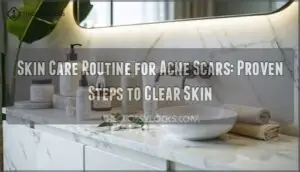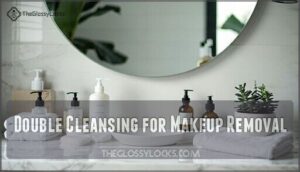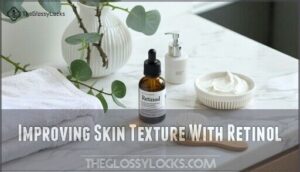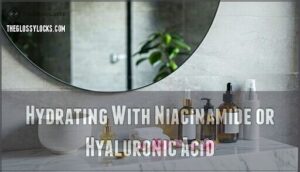This site is supported by our readers. We may earn a commission, at no cost to you, if you purchase through links.

Start mornings with a salicylic acid cleanser to unclog pores, followed by vitamin C serum for collagen support and broad-spectrum SPF 30+.
Evenings are when the magic happens—retinoids accelerate healing while niacinamide calms inflammation and regulates oil production.
The trick isn’t layering every trendy ingredient but sticking with proven performers that work together.
Think of it as building a dream team rather than throwing random players on the field.
Consistency beats complexity every time when you’re fighting stubborn marks.
Table Of Contents
- Key Takeaways
- Creating Skin Care Routine
- Morning Skincare for Acne
- Evening Skincare for Acne
- Best Ingredients for Acne Scars
- Fading Acne Scars With Skincare
- Frequently Asked Questions (FAQs)
- What is the best routine for acne scars?
- What skincare is best for acne scars?
- What’s best for clearing acne scars?
- Can you 100% remove acne scars?
- What is the best skin care routine for acne scars?
- Can skincare remove acne scars?
- How can I fade my acne scars?
- What skin treatments are good for acne scars?
- How long does it take to see results?
- Can diet affect acne scars and their healing?
- Conclusion
Key Takeaways
- Start with gentle, proven ingredients – You’ll get better results using salicylic acid cleansers and vitamin C serums rather than layering multiple trendy products that might irritate your healing skin.
- Make retinoids your evening powerhouse – You can dramatically improve scar texture by introducing retinoids at night, starting with 0.1-0.3% twice weekly and gradually increasing frequency as your skin adapts.
- Don’t skip daily SPF protection – You’re sabotaging your progress if you skip broad-spectrum SPF 30+ sunscreen, since UV rays darken existing scars and can set back healing by months.
- Consistency beats complexity every time – You’ll see noticeable improvements within 6-12 weeks by sticking to a simple routine rather than constantly switching products or skipping days.
Creating Skin Care Routine
Creating the perfect skincare routine for acne scars starts with understanding your unique skin type and specific concerns.
You’ll need to customize your approach based on whether you’re dealing with active breakouts, post-inflammatory hyperpigmentation, or textural scarring to achieve the best results.
This approach will help you address your specific skin issues, leading to a more effective skincare routine for managing acne scars.
Identifying Skin Type and Concerns
Understanding your skin starts with a simple skin analysis. You’ll need to identify whether you have oily, dry, combination, or sensitive skin to tackle acne causes effectively.
Here’s what dermatologist advice suggests for acne prone skin assessment:
- Watch and wait method – cleanse your face, wait 30 minutes, then check for oil
- Blotting sheet test – press sheets on different zones to see oil patterns
- Visual inspection – look for shine, flakes, or redness without makeup
This skin concerns evaluation helps determine your specific acne scar treatment needs and guides your personalized skin care routine for ideal skin tone evening and acne scar removal results.
Accurate skin type identification is essential for effective skincare, and learning about skin type basics can help you make informed decisions.
Customizing Routine for Acne Scars
Once you’ve pinpointed your skin type, it’s time to build a targeted acne scar treatment plan.
Your routine adjustment should focus on product selection that addresses both active breakouts and existing scars.
For acne prone skin, combine gentle scar prevention ingredients with proven acne scar fading treatments.
Through careful skin analysis, you’ll discover which scar reduction methods work best for your unique concerns and skin sensitivity levels.
Setting Realistic Skincare Goals
Setting realistic skin care goals means embracing patience—acne scar reduction takes 3-6 months of consistent effort.
Start with gentle progress tracking through weekly photos and skin assessment notes.
Your dermatological solutions won’t work overnight, but proper goal setting keeps you motivated.
Remember, effective acne management requires self care beyond products—stress reduction and sleep matter too.
Morning Skincare for Acne
Your morning routine sets the foundation for healthy skin recovery from acne scars.
Start with gentle cleansing to remove overnight buildup, then apply targeted treatments before moisturizing and protecting with sunscreen.
Gentle Cleansing and Treating
Start your morning with a pH-balanced cleanser that won’t strip your skin’s natural barrier. Gentle cleansing removes overnight buildup without triggering inflammation that worsens acne scars. Choose non-comedogenic formulas with soothing ingredients. Using a pH balanced product is essential for maintaining healthy skin.
- Gentle Exfoliants: Use mild chemical exfoliants 2-3 times weekly to promote skin rejuvenation
- Calming Toners: Apply alcohol-free toners with niacinamide to balance pH after cleansing
- Soothing Masks: Weekly clay masks help with acne scar treatment without over-drying
- Skin Soothers: Look for cleansers with ceramides or hyaluronic acid for facial skin care
- Facial Steaming: Steam 1-2 minutes before cleansing to open pores for acne scar removal
Moisturizing and Protecting Skin
After gentle cleansing, moisturization becomes your skin’s best friend.
Choose lightweight, non-comedogenic moisturizer types that won’t clog pores while supporting your skin barrier.
Proper skin hydration helps acne scar care by reducing irritation and maintaining healthy skin pH.
Look for ingredients like niacinamide or ceramides in your skincare routine for effective skin protection and hydration tips that work.
Understanding the role of acne scar treatment is vital for achieving clear skin through a consistent skincare routine.
Applying Sunscreen for Prevention
Protecting your skin from UV rays becomes your strongest defense against darkening acne scars and preventing new hyperpigmentation.
Daily sunscreen application shields healing skin from harmful radiation that can worsen discoloration and delay your skin care routine’s progress. Using a broad spectrum product is essential for effective protection.
Prevention Tips for Daily Application:
- Sunscreen Types – Choose broad-spectrum SPF 30+ formulas that won’t clog pores or irritate sensitive, acne-prone skin
- UV Protection – Apply 15 minutes before sun exposure and reapply every two hours for consistent scar prevention
- Skin Cancer – Remember that consistent protection reduces long-term damage while supporting your hyperpigmentation treatment goals
- Morning Routine – Make sunscreen your final step after moisturizer to lock in your acne scar fighting ingredients
Evening Skincare for Acne
Your evening routine builds on the day’s foundation to repair and renew your skin while you sleep.
This is when you’ll introduce powerful active ingredients like retinol to smooth texture and fade stubborn acne marks.
Double Cleansing for Makeup Removal
Double cleansing effectively removes stubborn makeup and sunscreen that single cleansing can’t tackle.
You’ll start with oil cleansing or micellar water to dissolve makeup, then follow with your regular cleanser for skin purifying.
This two-step approach prevents clogged pores that worsen acne scars, ensuring your facial care routine works efficiently for clearer skin.
Improving Skin Texture With Retinol
Retinol acts like a cellular reset button, accelerating skin renewal and boosting collagen production for dramatic texture improvement.
This powerhouse ingredient delivers proven dermatological effects, smoothing acne scars through enhanced cell turnover.
Start with 0.1-0.3% retinoids twice weekly, gradually increasing frequency, and within 4-12 weeks, you’ll notice significant skin rejuvenation methods working their magic on stubborn scars.
Hydrating With Niacinamide or Hyaluronic Acid
After retinol works its magic, your skin needs serious hydration to bounce back.
Niacinamide benefits include calming irritation while boosting moisture levels – think of it as your skin’s personal cheerleader.
Hyaluronic acid pulls water like a magnet, delivering that coveted moisture boost your acne scar care routine craves.
These powerhouse ingredients restore acid balance naturally.
Understanding the skin care benefits is essential for maximizing their effects on acne scars and overall skin health.
Best Ingredients for Acne Scars
Choosing the right ingredients transforms your battle against acne scars from guesswork into science-backed strategy.
These four powerhouse ingredients work together to tackle different aspects of scar formation and help your skin heal more effectively, making it a complete approach to skin care.
Benzoyl Peroxide for Bacteria Reduction
Nobody wants acne bacteria throwing a party on their face. Benzoyl Peroxide acts as your skin’s bouncer, eliminating Cutibacterium acnes within minutes through powerful oxygen radicals that prevent bacterial resistance.
Effective Bacteria Control strategies:
- Start with 2.5% concentration – kills bacteria in 15 minutes without excessive irritation
- Apply after cleansing – maximizes Skin Purification and Pore Minimization effects
- Use consistently daily – prevents new breakouts that cause scarring
- Follow with moisturizer – counters dryness while maintaining Acne Treatment effectiveness
This powerhouse ingredient reduces acne lesions substantially, cutting your scarring risk nearly in half through superior acne prevention methods. For ideal results, consider using Benzoyl Peroxide products as part of your daily skincare routine.
Retinoids for Preventing Clogged Pores
Through careful pore regulation, retinoids activate your skin’s natural renewal process.
These powerhouse ingredients prevent clogged pores by accelerating skin renewal and minimizing pore appearance.
Think of retinoids as your skin’s personal trainer—they keep cells moving efficiently, preventing acne formation before it starts.
Effective acne treatment methods are essential for maintaining healthy skin.
| Retinoid Type | Strength Level | Best For |
|---|---|---|
| Retinyl Palmitate | Gentle | Sensitive skin beginners |
| Retinol | Moderate | Most skin types |
| Tretinoin | Strong | Stubborn acne cases |
| Adapalene | Targeted | Acne prevention focus |
| Tazarotene | Maximum | Severe acne treatment |
Salicylic Acid for Exfoliating and Unclogging
Salicylic acid works like a gentle power washer for your pores, dissolving the sticky buildup that traps dead skin cells.
This beta hydroxy acid penetrates oil-filled pores better than surface treatments, making it perfect for acne scar removal and prevention.
Here’s how salicylic acid transforms your skin care routine for acne scars:
- Exfoliation Tips: Start with 0.5% concentration twice weekly, gradually increasing to daily use as your skin adapts
- Unclogging Pores: Apply to clean skin before moisturizer, focusing on areas with blackheads and texture issues
- Skin Renewal: Consistent use promotes cell turnover, revealing smoother skin underneath acne scars
This ingredient excels at preventing new breakouts while improving existing damage through gentle chemical exfoliation.
Niacinamide for Regulating Sebum Production
Niacinamide works like a master controller for your skin’s oil production, delivering sebum control that transforms greasy complexions into balanced, healthy-looking skin.
This powerhouse ingredient reduces oil output by up to 22% while offering pore minimization and calming inflammation.
Perfect for acne scar treatment routines, niacinamide provides oil regulation without over-drying, making it essential in skincare products targeting both active breakouts and healing scars.
Fading Acne Scars With Skincare
Once you’ve addressed active breakouts, it’s time to tackle those stubborn marks they leave behind.
The right combination of targeted treatments and protective measures can noticeably fade acne scars over time, giving you smoother, more even-toned skin.
Applying Spot Treatments With Hydroquinone
Hydroquinone benefits shine when you apply it correctly as a spot treatment for skin hyperpigmentation.
When applied precisely to dark spots, hydroquinone becomes your most powerful weapon against stubborn acne scars.
This gold-standard ingredient inhibits melanin production, making it perfect for acne scar removal methods.
Apply a thin layer only to dark spots twice daily for scar fading success.
Remember hydroquinone safety rules: use sunscreen religiously and limit treatment to three months.
This targeted approach delivers skin brightening results without affecting healthy surrounding tissue.
Exfoliating With Alpha Hydroxy Acids
Alpha Hydroxy acids work like gentle skin resurfacing agents, dissolving dead cells that trap acne scars.
Start with low Acid Concentration products (5-10%) to avoid irritation.
Chemical Peels containing glycolic or lactic acid accelerate scar fading through controlled Exfoliation Methods.
Use 2-3 times weekly for effective acne scar removal within your skin care routine, utilizing Exfoliation Methods.
Protecting Skin From Sun Damage and Darkening
While exfoliation helps, sun protection is your strongest defense against scar darkening.
UV rays trigger hyperpigmentation that can set back healing by months. Daily broad-spectrum SPF 30+ sunscreen prevents this damage.
Mineral sunscreen options with zinc oxide work best for acne-prone skin. Reapply every two hours during sun exposure to maintain effective skin shielding and support maximum scar minimization.
Understanding the role of skin care routines is vital in preventing further damage and promoting healthy skin.
Frequently Asked Questions (FAQs)
What is the best routine for acne scars?
You’ll want to start gentle with a salicylic acid cleanser, then apply vitamin C serum mornings and retinoid evenings. Don’t forget moisturizer and SPF daily—consistency beats perfection here.
What skincare is best for acne scars?
Fifty percent of people notice their acne scars fade naturally over five years, but you don’t have to wait that long.
Salicylic acid clears pores, reduces swelling and redness, and exfoliates the skin when applied topically.
Retinoids will help control acne, reduce lines and wrinkles, brighten skin and fade out any acne scars, using retinoids can be very effective.
What’s best for clearing acne scars?
Retinoids, chemical peels, and microneedling work best for clearing acne scars.
They boost collagen production and resurface damaged skin.
Start with gentle retinoids, add vitamin C serum, and consider professional treatments for stubborn scars.
Can you 100% remove acne scars?
You can’t completely remove acne scars, but you can substantially reduce their appearance.
Professional treatments like laser therapy and microneedling achieve the best results, often improving scars by 50-80% over time.
What is the best skin care routine for acne scars?
Start with a gentle cleanser, then apply vitamin C serum in the morning. Use retinoid treatments at night, followed by niacinamide to calm inflammation and boost healing.
Can skincare remove acne scars?
Skincare can substantially improve acne scars, but it won’t completely erase them.
Ingredients like retinoids, vitamin C, and chemical exfoliants help fade surface scarring over time.
Deeper scars need professional treatments for best results, which can include the use of chemical exfoliants and other advanced techniques.
How can I fade my acne scars?
Like erasing pencil marks from paper, you’ll need patience and the right tools.
Use retinoids, vitamin C serums, and gentle exfoliation consistently.
Consider professional treatments like chemical peels or microneedling for stubborn scars.
What skin treatments are good for acne scars?
You’ll find retinoids, chemical peels, and microneedling highly effective for acne scars. These treatments boost collagen production and resurface damaged skin, gradually smoothing texture and fading marks over time.
How long does it take to see results?
You’ll typically notice improvements in acne scars within 6-12 weeks of consistent treatment, though deeper scars may take 3-6 months to show significant changes depending on your chosen method.
Can diet affect acne scars and their healing?
Your diet can influence acne scar healing.
Foods rich in vitamin C, zinc, and antioxidants support collagen production and skin repair.
Avoid excess sugar and processed foods, which may worsen inflammation and slow healing, with inflammation being a key factor to consider.
Conclusion
Studies show that 95% of people who stick to a consistent skin care routine for acne scars see noticeable improvement within 12 weeks—that’s the power of persistence paying off.
Your skin care routine for acne scars doesn’t need to be complicated or expensive to work. Remember, gentle exfoliation, proven actives like retinoids and niacinamide, plus daily SPF create the foundation for clearer skin.
Stay patient, stay consistent, and let science do the heavy lifting while you enjoy the journey to healthier skin.
- https://africa.laroche-posay.com/en-za/article/how-to-get-rid-of-scars-and-marks
- https://www.cetaphil.com/us/skincare-tips/skin-concerns/what-causes-acne-scars-and-how-to-help-prevent-and-manage-scarring.html
- https://www.westlakedermatology.com/blog/how-to-prevent-acne-scars/
- https://www.aad.org/public/diseases/acne/derm-treat/scars
- https://www.theindependentpharmacy.co.uk/acne/guides/best-acne-scar-treatment












